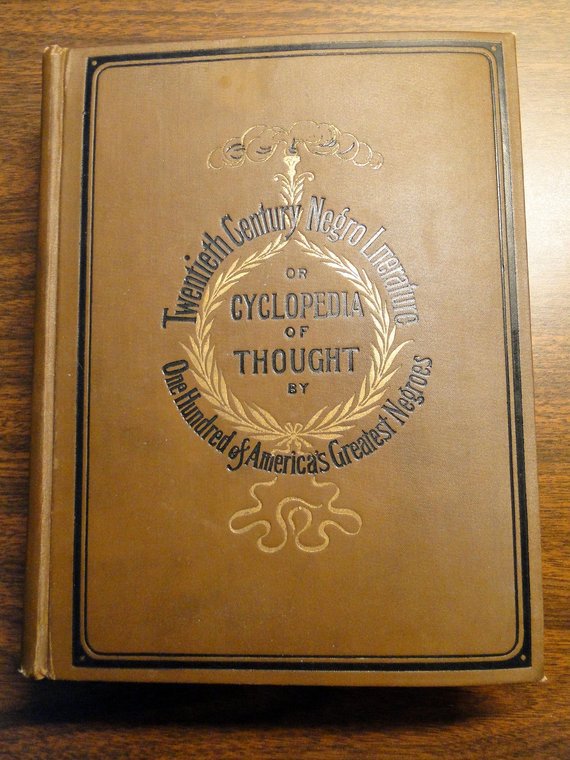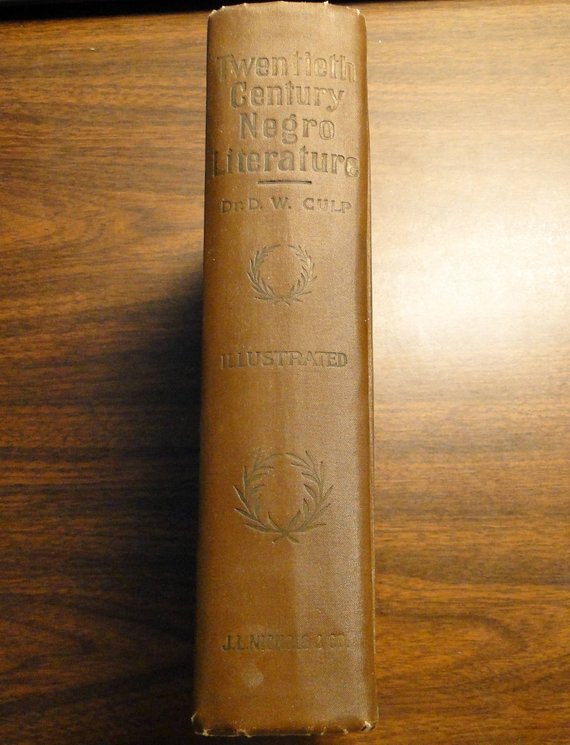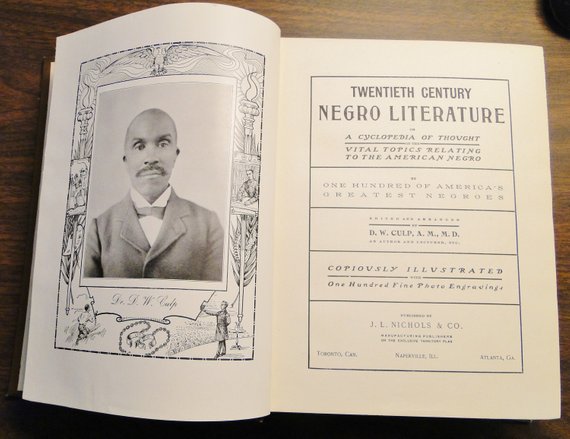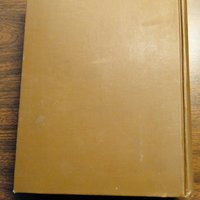-
Title
-
Twentieth Century Negro Literature; or, A Cyclopedia of Thought on the Vital Topics Relating to the American Negro
-
This edition
-
"Twentieth Century Negro Literature; or, A Cyclopedia of Thought on the Vital Topics Relating to the American Negro" . Ed. Daniel Wallace Culp. Naperville, IL, and Atlanta, GA: J. L. Nichols, 1902. 472 pp. (plus unnumbered pages with portraits and biographies of each of the contributors at the start of their contribution = 200 additional pages)
-
Other editions, reprints, and translations
-
• Repr. New York: Arno, 1969. 472 pp.
• Repr. Alexandria, VA: Chadwyck-Healey, 1987. (Black Biographical Dictionaries, 1790-1950, no. 71.) Microfiche.
-
Online access
-
• Google Books : (Stanford University copy): several pages in this reproduction are illegible (e.g., 36, 38, 96 [last lines], 110-11 [last lines], 130 [last lines], 132 [last lines], 156 [last lines], 172, 246, 248 [last lines], 254, 269, 318, 332 [last line], 361, 446-47, facing 455 [bio. of Geo. L. Knox], facing 465 [bio. of E. E. Cooper], 468, facing 469 [bio. of William R. Pettiford]) or missing (e.g., 40-41, 60-61, 66-67, 140-41, 170, 181, 262-63, 308, 372-73, 448, 470-71) or out of sequence (e.g., 309 appears b/w 311 and 312)
-
Google Books (Stanford copy)
-
• Google Books (U of Michigan copy): [this reproduction appears to be sound]
-
Google Books (U of Michigan copy)
-
• HathiTrust (U of Michigan copy): [this reproduction appears to be sound]
-
HathiTrust
-
• Internet Archive
-
Internet Archive
-
• New York Public Library digital collections
-
New York Public LIbrary
-
• Project Gutenberg (transcription, 2006)
-
Project Gutenberg
-
Table of contents
-
Daniel W. Culp / Preface (5-6)
[Portrait of Prof. W. H. Crogman (recto) & Biographical note on Crogman (verso)]
Prof. W. H. Crogman (chair of Greek and Latin, Clark Atlanta Univ.; author of "Talks for the Times") / Introduction (dated 16 Dec. 1901) (7-9)
[Walter I. Lewis / The Editor's Biography [Daniel W. Culp] (rector & verso)]
Topic I: Did the American Negro make, in the nineteenth century, achievements along the lines of wealth, morality, education, etc., commensurate with his opportunities? If so, what did he make?
• Mary B. Talbert (portrait & biographical note) / [First paper] (17-21)
• Josephine Silone Yates (portrait & biographical note) / [Second paper] (21-29)
• Rev. J. W. E. Bowen (portrait & biographical note) / [Third paper] (29-34)
• Rev. M. C. B. Mason (portrait & biographical note) / [Fourth paper] (34-37)
• Rev. D. Webster Davis (portrait & biographical note) / [Fifth paper] (38-41)
Topic II: Will it be possible for the Negro to attain, in this country, unto the American type of civilization?
• Bishop H. M. Turner (portrait & biographical note) / [First paper] (42-45)
• Bishop L. H. Holsey (portrait & biographical note) / [Second paper] (46-48)
• R. S. Lovinggood (portrait & biographical note) / [Third paper] (48-51)
• Bishop J. W. Hood (portrait & biographical note) / [Fourth paper] (51-56)
Topic III: How can the friendly relations now existing between the two races in the south be strengthened and maintained?
• Hon. Henry Plummer Cheatham (portrait & biographical note) / [First paper] (57-62)
• Rev. William D. Chappelle (portrait & biographical note) / [Second paper] (63-68)
• Rev. Sterling N. Brown (portrait & biographical note) / [Third paper] (68-71)
Topic IV: Should the Negro be given an education different from that given to the white?
• James W. Johnson (portrait & biographical note) / [First paper] (72-75)
• Prof. James Storum (portrait & biographical note) / [Second paper] (75-80)
• Rev. S. G. Atkins (portrait & biographical note) / [Third paper] (80-83)
• Rev. Joshua H. Jones (portrait & biographical note) / [Fourth paper] (83-88)
Topic V: Should the ignorant and non-property holding Negro be allowed to vote?
• John P. Green (portrait & biographical note) / [First paper] (89-91)
Topic VI: Is the criminal Negro justly dealt with in the courts of the South?
• Attorney Reuben S. Smith (portrait & biographical note) / [First paper] (92-104)
• Attorney Isaac Lawrence Purcell (portrait & biographical note) / [Second paper] (104-07)
• George T. Robinson, LL.B. (portrait & biographical note) / [Third paper] (108-10)
• Attorney J. Thomas Hewin (portrait & biographical note) / [Fourth paper] (110-14)
Topic VII: To what extent is the Negro pulpit uplifting the race?
• Bishop George Wylie Clinton (portrait & biographical note) / [First paper] (115-20)
• Rev. John B. L. Williams (portrait & biographical note) / [Second paper] (120-22)
• Rev. R. P. Wyche (portrait & biographical note) / [Third paper] (122-24)
• Rev. I. D. Davis (portrait & biographical note) / [Fourth paper] (124)
Topic VIII: Is it time for the Negro colleges in the south to be put into the hands of Negro teachers?
• Prof. Nathan B. Young (portrait & biographical note) / [First paper] (125-28)
• Prof. D. J. Jordan (portrait & biographical note) / [Second paper] (129-32)
• Prof. George A. Goodwin (portrait & biographical note) / [Third paper] (132-39)
• Mrs. Paul Laurence Dunbar (Alice Ruth Moore) (portrait & biographical note) / [Fourth paper] (139-41)
Topic IX: Will the education of the Negro solve the race problem?
• Booker T. Washington (portrait & biographical note) / [First paper] (142-53)
• Prof. John Russell Hawkins (portrait & biographical note) / [Second paper] (153-57)
• Prof. Kelley Miller (no portrait or biographical note) / [Third paper] (158-62)
• Prof. C. H. Turner (portrait & biographical note) / [Fourth paper] (162-66)
Topic X: What role is the educated Negro woman to play in the uplifting of her race?
• Mrs. Rosetta Douglass Sprague (portrait & biographical note) / [First paper] (167-71)
• Mrs. Mary Church Terrell (portrait & biographical note) / [Second paper] (172-77)
• Mrs. Rosa D. Bowser (portrait & biographical note) / [Third paper] (177-82)
• Mrs. Sarah Dudly Pettey (portrait & biographical note) / [Fourth paper] (182-85)
Topic XI: How can the Negroes be induced to rally more to Negro busines enterprises and to their professional men?
• Rev. H. T. Johnson (portrait & biographical note) / [First paper] (186-89)
• Prof. John W. Gilbert (portrait & biographical note) / [Second paper] (190-93)
• J. R. Porter (portrait & biographical note) / [Third paper] (194-98)
Topic XII: What are the causes of the great mortality among the Negroes in the cities of the south and how is that mortality to be lessened?
• Mrs. Warren Logan (Adella Hunt) (portrait & biographical note) / [First paper] (199-202)
• Hon. Henry A. Rucker (portrait & biographical note) / [Second paper] (202-04)
• Dr. John R. Francis (portrait & biographical note) / [Third paper] (204-09)
• James Randall Wilder (portrait & biographical note) / [Fourth paper] (210-15)
• Dr. R. F. Boyd (portrait & biographical note) / [Fifth paper] (215-20)
• Dr. Henry R. Butler (portrait & biographical note) / [Sixth paper] (221-23)
Topic XIII: What should be the Negro's attitude in politics?
• Hon. George H. White (portrait & biographical note) / [First paper] (224-27)
• Timothy Thomas Fortune (portrait & biographical note) / [Second paper] (227-31)
• Hon George W. Murray (portrait & biographical note) / [Third paper] (231-35)
Topic XIV: Is the Negro as morally depraved as he is reputed to be?
• Prof. Butler Harrison Peterson (portrait & biographical note) / [First paper] (236-41)
• Prof. Augustus Ulysses Frierson (porrait & biographical note) / [Second paper] (241-46)
• Mrs. Mary E. C. Smith (portrait & biographical note) / [Third paper] (246-53)
Topic XV: Is the young Negro an improvement morally on his father?
• Edward MacKnight Brawley (portrait & biographical note) / [First paper] (254-57)
• Rev. J. Simeon Flipper (portrait & biographical note) / [Second paper] (257-59)
• Rev. E. C. Morris (portrait & biographical note) / [Third paper] (259-64)
• Mrs. Ariel Serena Hedges Bowen (portrait & biographical note) / [Fourth paper] (264-69)
Topic XVI: The Negro as a writer
• Rev. J. Q. Johnson (portrait & biographical note) / [First paper] (270-71)
• Walter I. Lewis (portrait & biographical note) / [Second paper] (272-74)
• George Marion McClellan (portrait & biographical note) / [Third paper] (275-86)
Topic XVII: Did the American Negro prove, in the nineteenth century, that he is intellectually equal to the white man?
• Rev. M. W. Gilbert (portrait & biographical note) / [First paper] (287-90)
Topic XVIII: What progress did the American white man make in the nineteenth century along the line of conceding to the Negro his religious, political and civil rights?
• John Wesley Cromwell (portrait & biographical note) / [First paper] (291-95)
• Rev. James Monroe Cox (portrait & biographical note) / [Second paper] (295-98)
Topic XIX: The Negro as a laborer
• N. W. Harllee (portrait & biographical note) / [First paper] (299-301)
• Prof. R. G. Robinson (portrait & biographical note) / [Second paper] (302-04)
• Miss Lena T. Jackson (portrait & biographical note) / [Third paper] (304-08)
Topic XX: The Negro as a Christian
• Rev. William E. Partee (portrait & biographical note) / [First paper] (309-13)
• Rev. L. B. Ellerson (portrait & biographical note) / [Second paper] (313-15)
• Rev. Walter H. Brooks (portrait & biographical note) / [Third paper] (315-17)
• Rev. Henry H. Proctor (portrait & biographical note) / [Fourth paper] (317-19)
• Rev. S. Kerr (portrait & biographical note) / [Fifth paper] (320-22)
Topic XXI: Does the North afford to the Negro better opportunities of making a living than the South?
• Rev. J. H. Anderson (portrait & biographical note) / [First paper] (323-25)
• Prof. W. H. Councill (portrait & biographical note) / [Second paper] (325-29)
Topic XXII: What is the Negro teacher doing in the matter of uplifting his race?
• Prof. Arthur St. George Richardson (portrait & biographical note) / [First paper] (330-34)
• Prof. E. L. Blackshear (portrait & biographical note) / [Second paper] (334-38)
• Prof. Thomas Washington Talley (portrait & biographical note) / [Third paper] (338-41)
• Prof. H. L. Walker (portrait & biographical note) / [Fourth paper] (342-46)
Topic XXIII: Is the Negro newspaper an important factor in the elevation of the Negro?
• Dr. D. Watson Onley (portrait & biographical note) / [First paper] (347-49)
• Walter W. Wallace (portrait & biographical note) / [Second paper] (349-50)
• Richard W. Thompson (portrait & biographical note) / [Third paper] (351-55)
Topic XXIV: Are other than Baptist and Methodist churches adapted to the present Negro?
• Rev. George F. Bragg, Jr. (portrait & biographical note) / [First paper] (356-59)
• Rev. John W. Whittaker (portrait & biographical note) / [Second paper] (359-63)
• Rev. Owen M. Waller (portrait & biographical note) / [Third paper] (363-69)
Topic XXV: The Negro as a business man
• Hon. Theodore W. Jones (portrait & biographical note) / [First paper] (370-75)
• Andrew Franklin Hilyer (portrait & biographical note) / [Second paper] (375-82)
• Rev. J. H. Morgan (portrait & biographical note) / [Third paper] (383-87)
Topic XXVI: The Negro as a farmer
• Prof. George W. Carver (portrait & biographical note) / [First paper] (388-94)
• Henry A. Hunt (portrait & biographical note) / [Second paper] (394-98)
Topic XXVII: The Negro as an inventor
• Henry E. Baker (portrait & biographical note) / [First paper] (399-413)
Topic XXVIII: What the omen?
• Prof. William S. Scarborough (portrait & biographical note) / [First paper] (414-17)
Topic XXIX: Why the Negro race survives
• Prof. Thomas de S. Tucker (portrait & biographical note) / [First paper] (418-26)
Topic XXX: The signs of a brighter future for the American Negro
• Rev. Francis J. Grimké (portrait & biographical note) / [First paper] (427-33)
Topic XXXI: Negro criminality
• John Henry Smyth (portrait & biographical note) / [First paper] (434-41)
Topic: XXXII: The American Negro's opportunities in Africa
• William H. Heard (portrait & biographical note) / [First paper] (442-44)
Topic XXXIII: The Negro and education
• Mrs. Lena Mason (portrait & biographical note) / [A poem] (445-46)
Topic XXXIV: A Negro in it
• Mrs. Lena Mason / [A poem] (447-48)
Topic XXXV: The Negro's adversities help him
• Prof. Joseph D. Bibb (portrait & biographical note) / [First paper] (449-53)
Topic XXXVI: The American Negro and his possibilities
• Geo. L. Knox (portrait & biographical note) / [First paper] (454-63)
Topic XXXVII: Important lessons from the awful tragedy
• Edward E. Cooper (portrait & biographical note) / [First paper] (464-67)
Topic XXXVIII: How to help the Negro to help himself
• Rev. William R. Pettiford (portrait & biographical note) / [First paper] (468-72)
-
About the anthology
-
• A collection, almost entirely, of new pieces, rather than previously published material.
-
Anthology editor(s)' discourse
-
• Dedication:
"To all persons of whatever race and of whatever section of our country, who in any way contributed, in the Nineteenth Century, to the financial, intellectual, moral and spiritual elevation of the Negro, the editor dedicates this book with the ardent hope, that before this century shall have ended, the Negro, through his own manly efforts, aided by his friends, shall reach that point in the American civilization, where he will be recognized and treated as any other American citizen."
• Preface:
"The object of this book is . . . (1) To enlighten the uninformed white people on the intellectual ability of the Negro. (2) To give to those, who are interested in the Negro race, a better idea of the extent to which he contributed to the promotion of America's civilization, and of the intellectual attainments made by him in the nineteenth century. (3) To reflect the views of the most scholarly and prominent Negroes of America on those topics, touching the Negro, that are now engaging the attention of the civilized world. (4) To point out, to the aspiring Negro youth, those men and women of their own race who, by their scholarship, by their integrity of character, and by their earnest efforts in the work of uplifting their own race, have made themselves illus//trious; also, to enlighten such youth on those ethical, political, and sociological questions, touching the Negro that will sooner or later engage their attention. 5) To enlighten the Negroes on that perplexing problem, commonly called the 'Race Problem,' that has necessarily grown out of their contact with their ex-masters and their descendants; and also to stimulate them to make greater efforts to ascend to that plane of civilization occupied by the other enlightened peoples of the world." (5-6)
The virtues of this book: "(1) This is the only book in which there is such a magnificent array of Negro talent. . . . (2) This is the only book from which one can get anything like a definite and correct idea of the progress made by the Negro since his Emancipation along all lines. (3) There is no book but this one in which there can be found expressed the thoughts of any considerable number of educated Negroes on so many political, religious, civil, moral and sociological problems touching the Negro, which are interesting alike to the politician, the moralist and the sociologist." (6)
The editor, D. W. Culp, notes that, "there are hundreds of other Negroes who are as scholarly, as prominent and as active in the work of uplifting their race as the one hundred herein given. These one hundred appear here, rather than others, for no other reason than that they are better know to the editor" (6).
-
Reviews and notices of anthology
-
• "Twentieth Century Negro Literature." "Atlanta Constitution" 16 March 1902: A8. "ProQuest".
"The volume is scheduled to come from the press within the next few weeks."
• "Short Reviews of New Books." "Atlanta Constitution" 4 May 1902: A8. "ProQuest".
"This volume contains an endless amount of information bearing upon nearly every phase of the negro problem and is made up of numerous well-written and thoughtful articles contributed by representative members of the negro race in the United States."
• "Congregationalist and Christian World" 13 Dec. 1902: 898. "ProQuest".
"In this interesting volume are included brief papers from 'one hundred of America's greatest Negroes.' A portrait and brief sketch of life history is given in each case. The subjects refer to the great problems which confront the Negro, of his conduct of life, his relation to the whites by whom he is surrounded, his business, educational and literary capacity, and his hopes for the future. The book represents the college educated man and woman of the present generation, though only one [= Booker T. Washington] of the three or four most prominent men of the race are included. It is a book which the American Negro and the American white man who is interested in the problems it considers will find of great interest, and not least so the portraits and biographical sketches. Its opinions vary from the absolute despair and counsel of emigration to Africa of Bishop Turner to a cheerful optimism in view of results already attained."
-
Commentary on anthology
-
• "'One Hundred of America's Greatest Negroes,' as they are designated on the title page, contribute as many essays on various important racial issues at the turn of the century. Though not very literary, the // collection is important as a period piece. With its emphasis on uplift and achievement and with contributors like George Washington Carver and Booker T. Washington, its tone is moderate. Militants like Du Bois and Trotter are conspicuously by their absence" (Kinnamon 1997: 477-78).
-
PBA Galleries, in their discussion of a copy of this work for sale, comment: "Something of a renaissance man, Daniel Wallace Culp was the first graduate in 1876 of Biddle University in North Carolina, going on to graduate with honors from Princeton Theological Seminary. After serving as a Minister at churches in Alabama and Tennessee, he studied Medicine, received his M.D. from an Ohio medical college and became superintendent of a Freedman’s Hospital in Georgia – a post, coveted by white physicians, from which he was soon “ejected”. He then moved to Florida, where he built up a successful private medical practice, briefly putting that aside to direct an elite Black high school, where James Weldon Johnson recalled him as a “well-educated man” but a “poor teacher” and administrator. This itinerant career, and his declining health, set the stage for Culp’s greatest achievement – compiling this massive anthology, with contributions by Booker T. Washington, Mrs. Paul Laurence Dunbar, Mary Church Terrell, Kelly Miller, and scores of now-forgotten African-American luminaries at the turn of the century. Culp’s tour de force is still widely cited by historians, a century later, for its unrivalled biographic information and its far-sighted consideration of such subjects as the achievement of Black inventors, the critical social role of Black women and whether Black colleges should be administered by Black educators rather than white philanthropists."
-
PBA Galleries Auctioneers
-
Cited in
-
• "A Select Bibliography of the American Negro". Comp. W. E. B. DuBois. Atlanta: Atlanta UP, 1905. 19. Available online via U of Massachusetts Libraries:
-
U of Massachusetts Libraries
-
• Kinnamon 1997: 477-78.
-
Item Number
-
A0006







